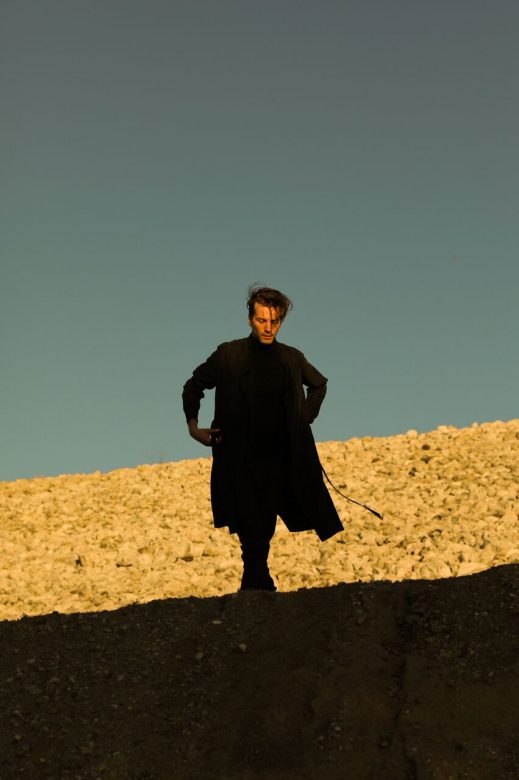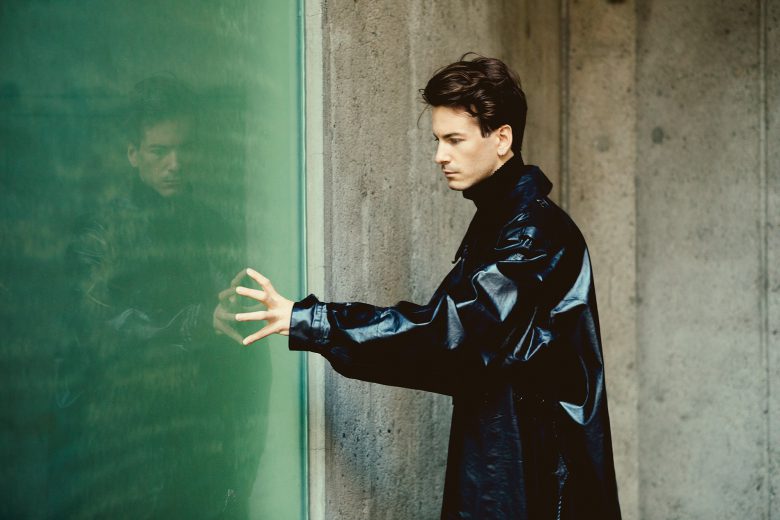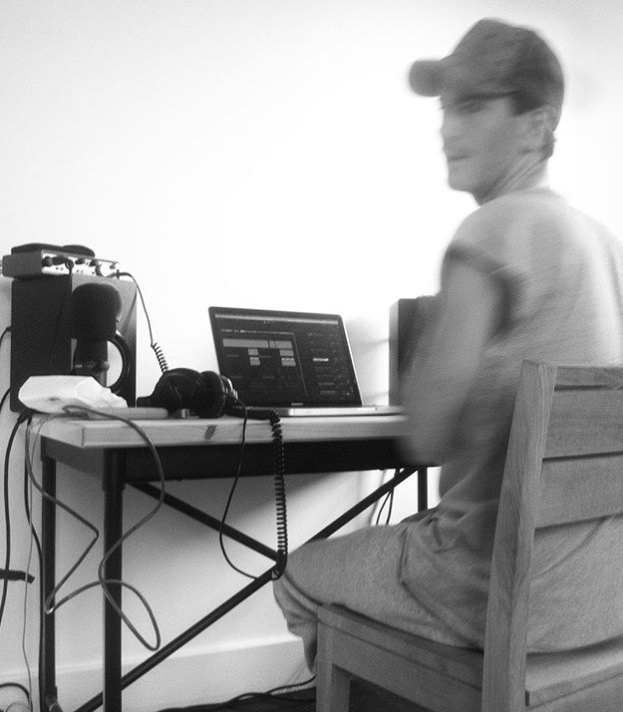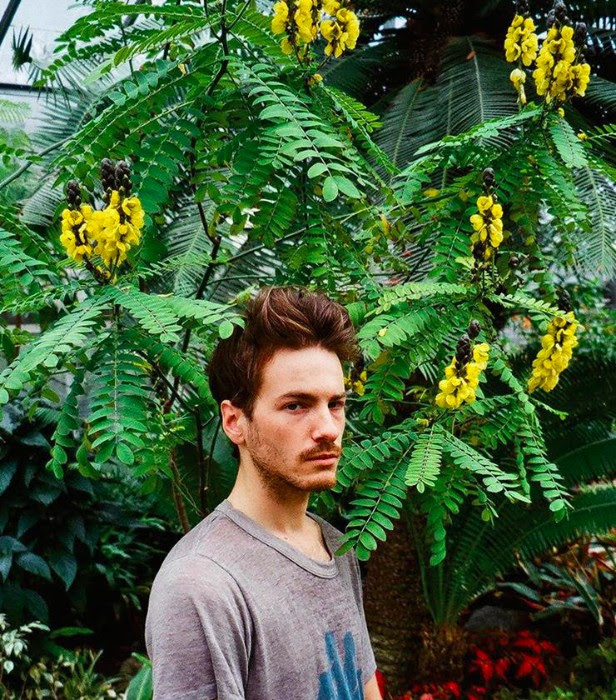This past April brought us The Destroyer Part 1, the latest release from TR/ST, the synth-soaked brainchild of Los Angeles-based artist Robert Alfons. Since releasing his first record in 2012 with then-band member Maya Postepski, Alfons has evolved the project into an ever-shifting musical and visual endeavor as a solo artist with bludgeoning synths, a beguiling range of vocal styles, and emotionally driven live shows.
After a five-year gestation period, The Destroyer is the band’s third full-length release and reunites Alfons with Postepski on a series of tracks that contribute to what has become an epic two-part project, the latter half to be released this November.
We spoke to Alfons about the emotional meat and creative genesis of The Destroyer along with his thoughts on L.A. and whether it’s possible to be too emo. Read the full Q&A after the jump!
�
There’s a clear emotional tone to the first installment of The Destroyer. You’ve used the word “healing” to describe it. Can you talk about the process of arriving at the themes on this record?
I think I had just been running away from facing and dealing with shit. In terms of how it comes out when writing music, I think that I would hide behind or would obscure things and make music that just kept obscuring and obscuring, so then this record became an opportunity to be a bit more forward.
In order to get that confidence, I had to break away from that continuous cycle of “make a record, make some music, l put it out, play shows, do a tour.” It gets repetitive and lacks the substance and the sensuality that I needed. I guess I’m just not like a good a business person in that way. But yeah, this record needed to have a different meaning for me.
With tracks like “Gone” from the first part of The Destroyer, there is a noticeable shift towards a very “pop” hook and vocal that contrasts with your past releases. I’m wondering about how those comfort levels shifted for you, and if it was intimidating for you to lyrically step forward more over time?
Of course. I mean I still struggle with the same things, but I couldn’t keep making the same sort of thing over and over again. There’s just no way that I could continue to do that. I think that the second installment of The Destroyer feels less pop, if there are elements on that first part that feel much more pop.
But, I think it was a challenge for me to figure out how to kind of distil ideas and be more direct. I can never just present the lyrics on their own — for me it’s very much tied in with the delivery and the music and I think that the emotive quality of the delivery is part of the message. I always reference Elizabeth Frasier of the Cocteau Twins regarding this because she’s the master of all and my biggest inspiration. She’s so masterful at delivering such a world and such emotive expression even though it was not always easily distinguishable what she is saying.
There’s a total metaphysical language that she’s using.
Absolutely. I’m so moved by all of those records.
There’s a fine line between being emotionally open and just straight up “emo,” which can be perceived as cheesy. Why were you insecure about lyrics or being more honest with them?
I mean that’s not really a big concern for me because I think my music is so emo. I think the music that I’ve always made has been really emo and it easily could be made fun of.
But what was I actually afraid of? I think honestly just like just existing and committing to putting it out. I know it sounds heavy, but it’s always that concern it’s just not good enough. It’s a dumb sort of perfectionist way of thinking and I think it has got me into trouble where you just sort of stand still as opposed to grow.
 You’ve spent a long time on these songs, with almost five years since your last release. Can you talk about the evolution of a song while you’re writing it and how you commit to a final product? As a perfectionist, how do you stop yourself or know that a song is in its final state?
You’ve spent a long time on these songs, with almost five years since your last release. Can you talk about the evolution of a song while you’re writing it and how you commit to a final product? As a perfectionist, how do you stop yourself or know that a song is in its final state?
I’m thinking of a few of the songs that we reworked like three times, but lots of them were really piano-based and atmospheric. I want to say it’s technical and there’s definitely a technical elements to it, but it’s like, “How did it feel until it got to a place where it felt right?”
It was just like the sound of the piano, the product after mixing — so it’s definitely a balance between the technical aspects and just a gut feeling about the songs in the context of everything else that was being finished.
Your music has frequently been described as “industrial,” which is a famously cold and hard genre. How do you find the balance between the emotional content that’s so prominent in your music and the more extreme elements of hard electronic music?
I think that my music’s always been extreme. It’s been driven by an emotive core. It’s always been a process of like dealing with personal shit, so it’s always been very unavoidably emo. I mean, I love industrial music. I wish I could make industrial music.
In contrast, the song “Destroyer,” which you recently released a video for, is very piano-based! I wondered if you were leaning towards more acoustic instrumentation and if the content of the songs affects the decision to use piano as opposed to the electronic production you’re known for?
Yeah, a lot of the songs in this catalogue have been written on the piano first. It’s always been an instrument that I can get a grasp of writing on. That’s not how every song is written, but it was always in the arc of what I wanted to do with the project, that at some point there’ll be piano without it being distorted or fucked with.
When it comes to the song “Destroyer,” it just sort of happened. I think the piano part was how it started and then I knew I didn’t want to transform it too far; I wanted to keep it in this world. That song was quite an easy process of getting it to its finished place.
Do you have any sense of fan expectations around you shifting genres?
I guess there’s always a part of me that thinks, “What can I get away with?” and that’s kind of fun! It’s childish. The core I lead from is centered on the themes I write with. It’s not so much a calculated navigation of “how do I keep people engaged” or “how do I get new fans.” People may drop off or people may only like certain parts of the record and that’s just what’s going to happen. It’s not a conscious thing for me. I have to keep doing things that interest me.
Can you talk about The Destroyer being broken into two separate records and your decision to separate the songs?
I see it as one record just released in two parts. At the end of four-and-a-half years or five years of writing, I had more than 16 songs. The second part is much more atmospheric. I just tried playing around with so many different track listings and like it was kind of like going from intensity to more atmospheric stuff and I felt, as a music fan myself, I would be a bit overwhelmed if I got a 16-song record all at once.
I felt like splitting it up was the way to do it the way to do it — thematically it feels like a nice flip. You’re flipping a record and getting a different mood. The first part is really intense and almost playful and then the second half is a little bit more moody, but for me it’s still one record.
You’ve already played a series of sold-out shows around the first half of this record. Have you played a lot of the second half live, and will the live show shift tonally as the record does?
No, we haven’t played them live, really! That’s what I’m in right now and it’s like mapping out track listings for shows, and it’s an exciting challenge to see how to change the tone.
The music itself is a different tone and so there needs to be that kind of attention in terms of visual too. This project has been kind a lot of beats and dance music almost and I think that this is an opportunity to showcase the other elements.
You reunited with one of your earliest collaborators, Maya Postepski, for this record. How and what led you to working together again?
She and I collaborated on five songs for the first part and then the last track on the second part. I think we missed each other and we have so much fun making music — and I think that we make really good music together!
You know, we had to do some healing there and it was a pretty fruitful decision. She’s very important to me and I think that shows in how much fun it is for us to work together.
It sounds like the writing of this record was partially bound to your personal connection to her. How did her presence influence the nature of the songs content-wise?
It’s not always super literal, but I believe that the history of our relationship plays out in the songs that we wrote. There’s a connection and a love there, and I think in order to have that level of connection and love, there are ups and downs.
Do you think that working with a close friend allows you to be braver and less guarded with your songs?
Absolutely. It’s not easy for me to open up and collaborate with others; I’m quite guarded. So, I think we built a level of faith in each other. There’s a mutual respect and a flow where she pushes something further along, I’ll push something else along and we feed off each other in a seamless way. We don’t agonize over details in a way that feels monotonous. It’s just fun!
TR/ST is essentially a solo project. Given your tendency to be very private in terms of the writing and recording process versus the very performative live show, is it weird for you to translate this solo experience into the band incarnation?
I think of it as a project and I’m the most constant member. The last record I wrote and produced entirely myself, but I still had somebody mix it and I had somebody else master it and I had a label and I had PR.
On a day-to-day level there are so many different people that are a part of either music being created or the accompanying visual, so that’s never lost to me. When it comes to the live show with the band, it’s just another form of collaboration, I think of it as a project of different solo spirits.
You spoke about your new single “Iris” as a sort of emotional center to the second half of The Destroyer. Can you talk specifically about that song and what you meant by that?
It was one of the first songs written for the album, and for that reason it felt like a blueprint. It just balances the emotionality and other more harsh production elements of things that I wanted to incorporate into the record.
At the beginning of TR/ST, you played a lot with anonymity, but since seem to have embraced more of an online or public persona, whether through social media, fashion collaborations or working with your peers. Can you talk about your changing comfort levels around being a visible artist?
I think social media has changed a lot, and it became a way for me to connect with so many people as my day-to-day life changed, say if I was traveling or staying in the city for a few months or whatever.
I’m trying to unpack it. I was like, “Wow, there’s a huge world out there that I’m almost shutting myself off from if I don’t at least make some effort.” I’m prone to isolating a lot, and I think it was in that way a conscious choice to be connected to people more. Having that network and the ability to connect with it was something I felt I could finally open myself up to.
Has relocating to Los Angeles affected your songwriting? Is the geographical shift a contributor to all this change you’re experiencing as an artist?
I always wonder that, and I’ve been made fun of by friends who are like, “When is your L.A. summer record coming out?” or whatever.
I mean, of course it does, but I feel like L.A. is so not fabulous. It’s really pretty messy and dirty and beautiful if you find the special moments of it, which I felt was similar to my experience in Toronto. You have to take the rock off and look underneath the thing.
With all this talk of newness and with The Destroyer itself being a transformational term itself, can you describe what you’re trying to communicate with these songs that you haven’t done in the past?
I think it’s that there’s no shame in disassembling an idea and risking putting forth something that feels right, but can potentially be imperfect or flawed.
If you had conceived of the record as two separate pieces instead a of double album, what would each side be titled?
I feel like the first one is masochistic and the second one is a stain. Stain. That was a running order title for a while.
Oh, geez. I thought the second part would be more cathartic, but it sounds like you’re still stuck in the shit!
Mm hmm! Forever! [laughing]
— Q&A by Kevin Hegge (@theekevinhegge)
Stream The Destroyer – Part 1 on Spotify and Apple Music
Stream The Destroyer – Part 2 on Spotify and Apple Music




Be the first to comment on "OMG, a Q&A with Robert Alfons of TR/ST"